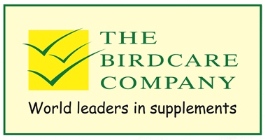Neck twisting and poor flying
At The Birdcare Company, we often get calls and e-mails from people whose birds are showing a number of different symptoms of poor nerve and/or muscle function. The most common are fits, twitching, neck twisting (stargazing), poor flying, inability to perch properly and twirling (twirling is when the bird gets onto its back and turns around in an attempt to get back upright).
Although there are a number of nasty possible causes of this sort of behaviour (infections, epilepsy etc), by far the most common cause is a simple shortage of calcium in the nerves and muscles. So it is easily fixed by feeding liquid calcium supplement Calcivet (CalciBoost) from The Birdcare Company, directly into the beak. This can be repeated every two hours or so until the bird recovers. We then recommend that you give your bird Calcivet (CalciBoost in America) five days a week for about a month to ensure that the bones are well topped up with calcium.
Although these calcium related problems can occur with any bird, three groups are particularly prone.
* The first is rapidly growing nestlings. If the bones are taking most of the calcium, the nerves and muscles can become deficient. Such cases are often reported in species being hand reared on "homemade formulas" and is particularly common in touracos who stargaze. Most other species show symptoms like splayed legs, rickets and lethargy.
* The second is young birds that have just about reached full size. These birds pump lots of calcium into the bones to harden them up and the nerves and muscles can be starved of this crucial mineral. Twirling is common, and canaries and gouldian finches are highly prone to this problem.
* The third group is egg laying hens whose demand for calcium to make eggs is very high. Normally this shows up as egg-binding which is often accompanied by poor flying, being on the floor with the legs spread.
Amongst adult birds, it is quite common for African greys and eclectus to "fall off the perch" in the middle of the night. Finches, canaries and budgerigars can all suffer from an array of the problems discussed above.
Prevention of these problems is easy with the chelated calcium supplement Calcivet (CalciBoost) given regularly once a week to non-breeding birds (twice a week for greys and eclectus) and five times a week for breeders. Do not give this product seven days a week as the body can become dependent on calcium from the gut and the bones lose their ability to correctly control blood calcium levels.
Calcivet (CalciBoost) works far more efficiently than other "traditional" calcium supplements because it has an exceedingly high absorption rate. It is also far stronger than the "copies" that have come into the UK market and so offers far better value for money than its weaker rivals.
Calcivet (CalciBoost) is available in liquid form and in powder form as Calcivet On Food Powder (or CalciBoost On Food Powder). Both of these types supplied by The Birdcare Company use the important chelated form of calcium, which is more easily absorbed by the bird into the blood where it is needed and is also more easily moved around the different cells of the body where calcium undertakes so many important roles for health, well being, fertility, egg laying and rearing strong chicks.
The important ingredients of Calcivet (CalciBoost) are also available in the new all-in-one product EasyBird, also from The Birdcare Company.
At The Birdcare Company, we often get calls and e-mails from people whose birds are showing a number of different symptoms of poor nerve and/or muscle function. The most common are fits, twitching, neck twisting (stargazing), poor flying, inability to perch properly and twirling (twirling is when the bird gets onto its back and turns around in an attempt to get back upright).
Although there are a number of nasty possible causes of this sort of behaviour (infections, epilepsy etc), by far the most common cause is a simple shortage of calcium in the nerves and muscles. So it is easily fixed by feeding liquid calcium supplement Calcivet (CalciBoost) from The Birdcare Company, directly into the beak. This can be repeated every two hours or so until the bird recovers. We then recommend that you give your bird Calcivet (CalciBoost in America) five days a week for about a month to ensure that the bones are well topped up with calcium.
Although these calcium related problems can occur with any bird, three groups are particularly prone.
* The first is rapidly growing nestlings. If the bones are taking most of the calcium, the nerves and muscles can become deficient. Such cases are often reported in species being hand reared on "homemade formulas" and is particularly common in touracos who stargaze. Most other species show symptoms like splayed legs, rickets and lethargy.
* The second is young birds that have just about reached full size. These birds pump lots of calcium into the bones to harden them up and the nerves and muscles can be starved of this crucial mineral. Twirling is common, and canaries and gouldian finches are highly prone to this problem.
* The third group is egg laying hens whose demand for calcium to make eggs is very high. Normally this shows up as egg-binding which is often accompanied by poor flying, being on the floor with the legs spread.
Amongst adult birds, it is quite common for African greys and eclectus to "fall off the perch" in the middle of the night. Finches, canaries and budgerigars can all suffer from an array of the problems discussed above.
Prevention of these problems is easy with the chelated calcium supplement Calcivet (CalciBoost) given regularly once a week to non-breeding birds (twice a week for greys and eclectus) and five times a week for breeders. Do not give this product seven days a week as the body can become dependent on calcium from the gut and the bones lose their ability to correctly control blood calcium levels.
Calcivet (CalciBoost) works far more efficiently than other "traditional" calcium supplements because it has an exceedingly high absorption rate. It is also far stronger than the "copies" that have come into the UK market and so offers far better value for money than its weaker rivals.
Calcivet (CalciBoost) is available in liquid form and in powder form as Calcivet On Food Powder (or CalciBoost On Food Powder). Both of these types supplied by The Birdcare Company use the important chelated form of calcium, which is more easily absorbed by the bird into the blood where it is needed and is also more easily moved around the different cells of the body where calcium undertakes so many important roles for health, well being, fertility, egg laying and rearing strong chicks.
The important ingredients of Calcivet (CalciBoost) are also available in the new all-in-one product EasyBird, also from The Birdcare Company.

